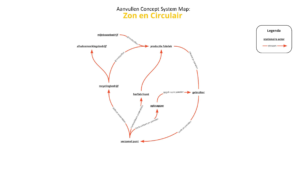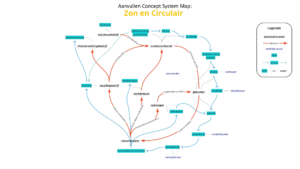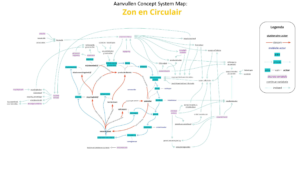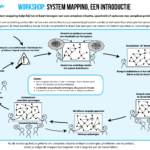Onze nieuwste Citizen van World of Minds is Hannah Härtwich, een ‘Complexity Counselor’ gespecialiseerd in o.a. System Mapping. System Mapping helpt bij het in kaart brengen van een complexe situatie, speelveld of het oplossen van complexe problemen. Een aantal klanten hebben we gevraagd mee te doen met de eerste workshop die we samen hebben georganiseerd; ‘An introduction to System Mapping’. Binnenkort organiseren we samen de tweede workshop.
De geleerde lessen hebben we inmiddels ingezet in diverse projecten en verandertrajecten waaronder een team ontwikkeltraject waarbij we de opgehaalde verhalen (Storymapping) hebben omgezet naar een Stem map en een complex speelveld met betrekking tot recycling en duurzaamheid met vele belangen en stakeholders. Ben je bezig als team om doelen te halen in een complexe omgeving of moet je een verandertraject of lastige transitie managen (waar je wel de regie wilt maar niet de macht hebt), neem dan contact op.
We kunnen je helpen met de System map stappen toe te lichten en/of als je iets bedacht hebt met je klankborden en kijken waar we samen zaken kunnen finetunen. Wil je met de volgende System map workshop meedoen? Schrijf je snel in!
Introductie van Hannah over haarzelf Stem Mapping
 I have always been fascinated by nature. Somehow everything fits together just right, everything is connected, nothing exists in isolation and while seeming surprisingly stable, the entire system is continuously evolving and increasing in complexity.
I have always been fascinated by nature. Somehow everything fits together just right, everything is connected, nothing exists in isolation and while seeming surprisingly stable, the entire system is continuously evolving and increasing in complexity.
Following this curiosity, I studied Geo–ecology, the study of ecosystems. After graduating, I continued to learn about systems on a more abstract level, which eventually led me to start my own business as Complexity Counselor. My favourite method is systems mapping.
Systems are all around and within us. Any time components interact with each other in a way that results in a behaviour that is greater than the sum of the parts, they form a system. A car, an animal, a family, a business and human society are all examples of systems. The more complex a system is, the more difficult it becomes to understand its behaviour.
Systems mapping visualises the components and interactions that make up a system. Making the system visible allows us to unravel the system and discover its underlying structure, which defines its behaviour. Most of the time no single person has the complete overview of a system. Systems mapping allows to align and combine multiple perspectives. Once a systems map is sufficiently complete, we can use it to analyse what causes the system to behave in undesired ways, decide what changes we could make to the system and what their impact would be and finally communicate the potential systems change strategy to others.
Systems mapping is a very versatile method that can be applied in many different contexts. From individual learning, over business strategy to government. In order to make more people familiar with this method, I am organising a workshop in cooperation with World of Minds, during which I explain and give the participants the opportunity to practice this method. The workshop consists of two sessions of 2.5 hours. The very first iteration of this workshop takes place on the 20. October and more will follow in the future.
In my opinion the most important application for systems mapping is tackling complex ownerless problems, like pollution and waste, climate change and biodiversity loss. For these problems, no single stakeholder is able to solve them on their own, but this can no longer be the excuse for doing nothing. Instead we each need to understand our own role within and the influence we do have on the system, take on responsibility, take the first step, encourage others to follow suit, cooperate and work towards a shared goal.
Een mooi voorbeeld hiervan is een System Map die we hebben gemaakt met verschillende belanghebbenden die nader kijken naar het systeem voor het recyclen van zonnepanelen en uitdagingen aanpakken, zoals het minimaliseren van het risico op schade aan het milieu. Klik op de afbeeldingen hieronder om te zien hoe we de systeemkaart in drie stappen hebben opgebouwd.
Zelf meer leren over Systems Mapping of kunnen we je helpen?
Neem contact met ons op als je meer wilt weten over Systems Mapping (of schrijf je in voor de online workshop), en als we je kunnen helpen met complexe situaties in kaart te brengen.





